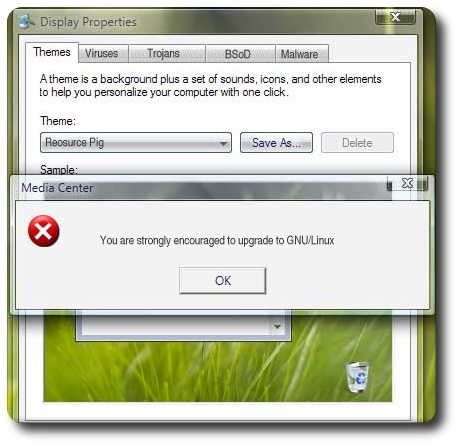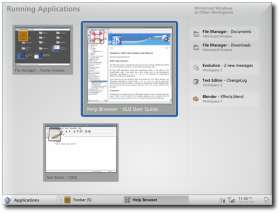
I learned to love the mockup that I had prepared with
the GNU Image Manipulation Program (GIMP) last month
 TEREOTYPES are hard to fight, but logical inclinations are even harder to change. Everyone wishes to push away the enemy, whatever or whoever that enemy may be. First they ignore, then they ridicule and laugh at the enemy. Finally, they fight, before inevitably conceding and losing (attribution: Ghandi was among some people to use this 4-step breakdown, but he was not necessarily the first).
TEREOTYPES are hard to fight, but logical inclinations are even harder to change. Everyone wishes to push away the enemy, whatever or whoever that enemy may be. First they ignore, then they ridicule and laugh at the enemy. Finally, they fight, before inevitably conceding and losing (attribution: Ghandi was among some people to use this 4-step breakdown, but he was not necessarily the first).
What point am I approaching here? Nobody likes foreseeing change. Change can leave one behind. Windows-defending ‘Internet trolls’ , and Windows advocates alike, fear becoming newbies so they will utter “Linux is terrible, hard, not ready for the desktop and so forth”. Maybe if they push it hard enough, they believe, one can win time for Microsoft to catch up, yet they most probably will not. This commotion has the adverse effect. The sooner people upgrade to Linux, the better. The world is heading towards open standards, Open Source, and one vocation that is opened by such migration — the Free Open Source: GNU/Linux.
As I said once in the past, I do not perceive myself as a typical, largely-ridiculed ‘Linux fanboy’. What I do appears to be constructive and beneficial for society’s computing infrastructure, as well as for quicker innovation in science and technology.
In recent months I have had the pleasure of sending Pamela Jones some news items on a daily basis. What a nice person she is! This morning I decided to learn a little more about her (non-personal) background and the following interview caught my mind (only a fragment appears beneath). I believe it supports the main point that I address above, as well as my previous post from yesterday.
(PJ:) They were always getting viruses and other malware, and eventually I learned why and how and what to do (not that they cooperated much), and one day I realized, “I really love this stuff.” When I discovered dual booting or a Knoppix CD meant you could see what went wrong on the Windows side, it changed my life. Eventually, I couldn’t enjoy Windows any more, partly because I saw finally there really was no way to secure a Windows 98 box no matter what you do, and partly because upgrading beyond Windows 2000 meant licenses to choke on, a lot because of privacy concerns, and also because I started resenting typing in numbers to prove I had paid for the software and feeling like I was being treated like I was criminally-inclined. The difference in how I felt using the two OSs was striking.
One day, I realized that this difference was “It”. Proprietary software and all the laws that back it up are designed to enforce restrictions on users. And that’s just what it felt like. For personal pleasure, I always turned to GNU/Linux, which felt like breathing clean air. No restrictions.
 T is pretty much evident by now that I have joined the Netscape team. I never denied it, nor did I say a word until it was official (and publicly stated).
T is pretty much evident by now that I have joined the Netscape team. I never denied it, nor did I say a word until it was official (and publicly stated). I am very much pleased to have gotten an opportunity to work with a group of talented people. Up, close and person, figures whom you were taught to dislike (principally Calacanis) are quite friendly and kind. They are not the devils that you were led to believe they are. What bothers me most are some recent accusations that come from conspiracy theorists. Some would argue that Netscape is trying to ‘poison’ Digg’s index, which is of course preposterous. Netscape would never use destructive measures or viral marketing techniques. To quote what fits the latter catergory (from Wikipedia).
I am very much pleased to have gotten an opportunity to work with a group of talented people. Up, close and person, figures whom you were taught to dislike (principally Calacanis) are quite friendly and kind. They are not the devils that you were led to believe they are. What bothers me most are some recent accusations that come from conspiracy theorists. Some would argue that Netscape is trying to ‘poison’ Digg’s index, which is of course preposterous. Netscape would never use destructive measures or viral marketing techniques. To quote what fits the latter catergory (from Wikipedia).





 Filed under:
Filed under: 
 ARELY should politicians get involved in the software industry. Ever. As a matter of fact, they generally fear that unknown as seldom will they be familiar with the latest technology. Everyone steers away from anything which can expose ignorance and lead to an embarrassment, at peer or public level.
ARELY should politicians get involved in the software industry. Ever. As a matter of fact, they generally fear that unknown as seldom will they be familiar with the latest technology. Everyone steers away from anything which can expose ignorance and lead to an embarrassment, at peer or public level.
 ERE is the latest find (a video) which illustrates how beautiful and powerful Linux has become. It is a showcase of
ERE is the latest find (a video) which illustrates how beautiful and powerful Linux has become. It is a showcase of  TEREOTYPES are hard to fight, but logical inclinations are even harder to change. Everyone wishes to push away the enemy, whatever or whoever that enemy may be. First they ignore, then they ridicule and laugh at the enemy. Finally, they fight, before inevitably conceding and losing (attribution: Ghandi was among some people to use this 4-step breakdown, but he was not necessarily the first).
TEREOTYPES are hard to fight, but logical inclinations are even harder to change. Everyone wishes to push away the enemy, whatever or whoever that enemy may be. First they ignore, then they ridicule and laugh at the enemy. Finally, they fight, before inevitably conceding and losing (attribution: Ghandi was among some people to use this 4-step breakdown, but he was not necessarily the first). S a programmer in training and background, I have always been told that I must keep up with the latest and the greatest — technology-wise that is — in oder to remain marketable. The way I perceive it, Windows technology that excludes the competition is a dying breed. I would not want to expand my knowledge in that area, which is why I continue to urge people to upgrade to Linux. At the same time, I rarely bother to keep up with advancements in the Windows world and yet I keep an eye on features and demonstrations that permit me to make a comparative analysis.
S a programmer in training and background, I have always been told that I must keep up with the latest and the greatest — technology-wise that is — in oder to remain marketable. The way I perceive it, Windows technology that excludes the competition is a dying breed. I would not want to expand my knowledge in that area, which is why I continue to urge people to upgrade to Linux. At the same time, I rarely bother to keep up with advancements in the Windows world and yet I keep an eye on features and demonstrations that permit me to make a comparative analysis. NE thing that keeps striking me as surprising is that people’s habits supersede all logic. I will provide an example from technology.
NE thing that keeps striking me as surprising is that people’s habits supersede all logic. I will provide an example from technology.
